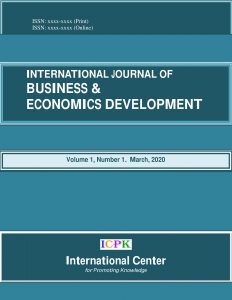Determinants of Group Loan Repayment Performance of Micro and Small-Scale Enterprises: Case study Oromia Credit and Saving Share Company (Eastern Wollega Zone Branch).
Mr. AmanuDabaWaktola (MSc.)
Abstract Preview
The study was intended to analyze the determinants of group loan repayment performance of MSE’s sectors a case of Oromia Credit and Saving Share Company operating in the East Wollega Zone. The survey data was conducted by using the structured questionnaire in order to collect primary data from the purposively selected branches whereas secondary data were collected from published and unpublished documents. Out of 424 total number of groups owned of MSE’s sectors 168 sample size were selected and only 162 of the respondents have filled the questionnaire properly by their respective enterprise’s group leaders. The collected data were analyzed by employing descriptive statistics and ordered logit model by using STATA soft ware version 12. Result of this study shows that out of the predicting variables used in this study, group leaders education level, group leaders experience in similar business, the enterprise’s beginning capital, loan repayment period, loan follow up, Training offered by the loan officers of OCSSCO and access to output market for the enterprises finished products were found to positively influence while the enterprises group size, additional loan they received, problem of information disclosure among members, the problem of financial statement recording experience in the business, loan interest rate, problem of power interruption and shortage of water supply around the enterprise working area have negatively influenced the group loan repayment performance of MSE‘s sectors in the study area. Based on this result, the author recommended that OCSSCO has to focus on the smaller the group size through which the problem of information disclosure would be resolved ,they has to give frequent training about the financial statement recording experience, they have to deal with the concerned body to solve the problem of power interruption as well as about the shortage of water supply around the enterprise’s business area and encouraging them to increase their beginning capital at the enterprise start up that used to build confidence in their loan repayment performance in thestudy area.
Utilizing Rasch Analysis to Establish the Psychometric Properties of an Economic Innovation Capacity Construct
Lauritz Mills, Ph.D
Abstract Preview
In today’s changing and highly competitive business environment, innovation and technology clusters are recognized as a powerful competitive tool. To be competitive, countries must improve their economic ecosystem to produce a highly skilled and educated workforce, enhance the quality of place to attract investments, provide services and infrastructure to support globally competitive firms, and develop more robust entrepreneurial and technological capacity among firms and industry. Measuring competitiveness is necessary to fully understand variables affecting countries’ and regions’ economic development. Yet, there is a lack of a psychometrically valid scale for innovation capacity construct for small island developing states. The purpose of this paper was to develop a reliable and valid scale of measurement for innovation capacity. The test comprised 25 items administered to 74 policymakers, business leaders, and economic development practitioners in the U.S. Virgin Islands. The data were analyzed using Rasch techniques to explore the instrument’s dimensionality, the items’ difficulty, the item’s fit, reliability, and internal construct validity. The dimensions included specialized skills, infrastructure facilities, technology firms, venture capital, supporting institutions and network activities, competitors, and governance.
The evolution of Corporate Reputation Management in Chinese Logistics Market
Adam Figiel, Veslav Kuranovic
Abstract Preview
The idea of a value chain was first suggested by Michael Porter (1985) to depict how customer value accumulates along a chain of activities that lead to an end product or service. Porter describes the value chain as the internal processes or activities a company performs “to design, produce, market, deliver and support its product.” He further states that “a firm’s value chain and the way it performs individual activities are a reflection of its history, its strategy, its approach to implementing its strategy, and the underlying economics of the activities themselves.” These are generally also the line activities of the organization. They include: inbound logistics—material handling and warehousing; operations—transforming inputs into the final product; outbound logistics—order processing and distribution; marketing and sales—communication, pricing and channel management; and service— installation, repair and parts.
Effectuation Theory and The Covid-19 Pandemic
A.Banu Goktan, Ph.D.
Abstract Preview
Coronavirus marked the year 2020 with its effect on the global economy in general and businesses in particular. Sarasvathy (2001) in her seminal piece proposed effectuation as a set of behaviors entrepreneurs use in the face of uncertainty and Berends et al. (2014) added that effectuation concerned actions under resource constraints, both defining effectuation as the model to be followed in an environment such as the COVID-19 pandemic where circumstances determine the path entrepreneurs take (Berends et al., 2014). Effectuation is a dynamic and interactive process (Sarasvathy, 2001) where entrepreneurs focus on what can be achieved in the short term with the resources at hand, utilizing pre-commitments and experimenting with new products and processes within the constraints of what the entrepreneur can afford to lose (Fisher, 2012). Anecdotal evidence from the pandemic suggest that larger organizations, organizations with significant investments in fixed assets, organizations that relied on a single customer or a single type of customer and organizations which operated in highly regulated environments found it difficult to follow the effectuation logic during the Covid-19 pandemic. While observations provide insight and help draw inferences, future studies should empirically examine the relationships proposed in this study.
